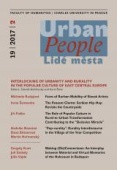Making (Dis)Connections
An Interplay between Material and Virtual Memories of the Holocaust in Budapest
DOI:
https://doi.org/10.14712/12128112.3324Klíčová slova:
shoah, digital memory, counter-monument, HungaryAbstrakt
Following Hoskins’ often-cited notion of “new memories” (Hoskins 2001), which are generated by traditional media in the broadcast-era, now, in a post-broadcast age, we seem to face yet another “memory boom” (Huyssen 2003), also known as a “connective turn” (Hoskins 2011). Instead of focusing on the consequences of this connective turn, however, in this paper, we aim to conceptualize another kind of (dis)connection: we analyse the interrelatedness of various – digital and analogue, virtual and material – memories. Focusing on the diverse practices of memorialising the Hungarian Shoah, and more specifically, on the controversy over the Memorial to the Victims of German Occupation in the urban, as well as digital space, we do not only show how memories (dis)connect an actual and a virtual community, but also how these different kinds of memories (dis)connect with each other in the urban and digital space.
Stahování
Publikováno
Jak citovat
Číslo
Sekce
Licence

Tato práce je licencována pod Mezinárodní licencí Creative Commons Attribution-NonCommercial-NoDerivatives 4.0.


